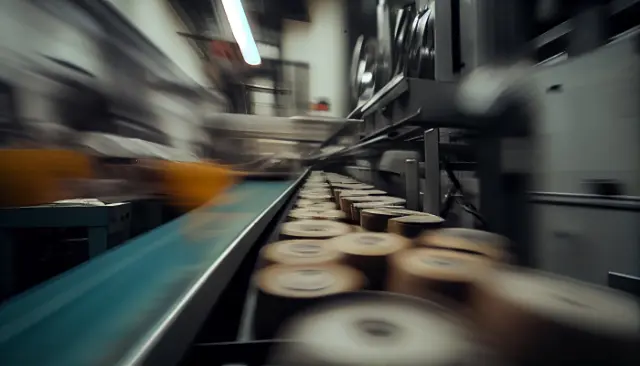Material Requirement Planning (MRP) Automation: A Journey Towards Manufacturing Excellence
Material Requirement Planning (MRP) is a critical process in manufacturing, but it can also be complex and time-consuming. Material Requirement Planning (MRP) Automation using RPA, Python, AI, and cloud-based solutions can streamline this process, making it more efficient and accurate.
MRP automation can help manufacturers:
- Reduce inventory holding costs
- Improve customer service by ensuring that products are available when needed
- Increase productivity by freeing up employees to focus on other tasks
Material Requirement Planning (MRP) Automation is a powerful tool that can help manufacturers improve their efficiency and profitability.
If you’re a manufacturer, then you know that Material Requirement Planning (MRP) is a critical process for ensuring that you have the right materials on hand to meet customer demand. But MRP can also be a complex and time-consuming process, especially for companies with a large number of products and complex supply chains.
Material Requirement Planning (MRP) Automation can help you streamline your MRP process, making it more efficient and accurate. By using RPA, Python, AI, and cloud-based solutions, you can automate many of the tasks that are traditionally done manually, such as:
- Gathering data from multiple sources
- Calculating material requirements
- Generating purchase orders
- Tracking inventory levels
Material Requirement Planning (MRP) Automation can help you:
- Reduce inventory holding costs
- Improve customer service by ensuring that products are available when needed
- Increase productivity by freeing up employees to focus on other tasks
Material Requirement Planning (MRP) Automation is a powerful tool that can help manufacturers improve their efficiency and profitability. If you’re not already using MRP automation, then now is the time to start.

Python, AI, and the Cloud: Empowering Material Requirement Planning (MRP) Automation
Python, AI, and the cloud are three powerful technologies that can be used to automate and improve the Material Requirement Planning (MRP) process.
Python is a versatile programming language that is well-suited for developing RPA bots. RPA bots can be used to automate a wide range of tasks, including:
- Gathering data from multiple sources
- Calculating material requirements
- Generating purchase orders
- Tracking inventory levels
AI can be used to improve the accuracy and efficiency of MRP automation. For example, AI can be used to:
- Identify patterns and trends in demand data
- Forecast future demand
- Optimize inventory levels
- Detect and resolve errors
The cloud provides a scalable and cost-effective platform for deploying and managing MRP automation solutions. Cloud platforms offer a wide range of features and services that can be used to support MRP automation, including:
- Compute power
- Storage
- Data analytics
- Machine learning
By using Python, AI, and the cloud, manufacturers can automate and improve their MRP processes, resulting in:
- Reduced inventory holding costs
- Improved customer service
- Increased productivity
Unattended Bots
Unattended bots are bots that can run without human intervention. They are typically used to automate tasks that are repetitive and time-consuming. In the context of MRP automation, unattended bots can be used to:
- Gather data from multiple sources
- Calculate material requirements
- Generate purchase orders
Attended Bots
Attended bots are bots that require human interaction to complete tasks. They are typically used to automate tasks that are complex or require human judgment. In the context of MRP automation, attended bots can be used to:
- Review and approve purchase orders
- Resolve errors
- Handle exceptions
Benefits of Cloud Platforms
Cloud platforms offer a number of benefits over traditional RPA/workflow tools orchestrators, including:
- Scalability: Cloud platforms can be scaled up or down to meet the needs of your business.
- Cost-effectiveness: Cloud platforms are typically more cost-effective than on-premises solutions.
- Reliability: Cloud platforms are highly reliable and offer a high level of uptime.
- Security: Cloud platforms offer a high level of security and compliance.
AI Techniques
AI can be used to improve the accuracy and efficiency of MRP automation in a number of ways. Some specific AI techniques that can be used for MRP automation include:
- Image recognition: Image recognition can be used to automate the process of identifying and counting inventory items.
- Natural language processing (NLP): NLP can be used to automate the process of extracting data from text documents, such as purchase orders and invoices.
- Generative AI: Generative AI can be used to generate new data, such as demand forecasts and inventory recommendations.
By using AI techniques, manufacturers can improve the accuracy and efficiency of their MRP processes, resulting in reduced inventory holding costs, improved customer service, and increased productivity.

Building the Material Requirement Planning (MRP) Automation
The MRP automation process can be divided into the following sub-processes:
- Data gathering
- Material requirements calculation
- Procurement recommendation
- Order placement
- Inventory tracking
How to Automate the MRP Sub-Processes
Python and Cloud can be used to automate each of the MRP sub-processes. Here are the steps involved:
Data gathering:
- Use Python to develop a script that extracts data from multiple sources, such as ERP systems, spreadsheets, and databases.
- Store the data in a cloud-based data warehouse.
Material requirements calculation:
- Use Python to develop a script that calculates material requirements based on the data in the data warehouse.
- Use AI to identify patterns and trends in demand data and forecast future demand.
Procurement recommendation:
- Use Python to develop a script that generates procurement recommendations based on the material requirements and inventory levels.
- Use AI to optimize inventory levels and detect and resolve errors.
Order placement:
- Use Python to develop a script that generates purchase orders and sends them to suppliers.
- Use the cloud to track the status of purchase orders and receive notifications when orders are shipped.
Inventory tracking:
- Use Python to develop a script that tracks inventory levels and updates the data warehouse.
- Use AI to identify trends in inventory levels and generate alerts when inventory levels are low.
Data Security and Compliance
Data security and compliance are important considerations for any automation project. When automating the MRP process, it is important to:
- Use encryption to protect sensitive data.
- Implement access controls to restrict access to data.
- Comply with all applicable laws and regulations.
Advantages of Python over No-Code RPA/Workflow Tools
Python offers a number of advantages over no-code RPA/workflow tools for MRP automation, including:
- Flexibility: Python is a versatile language that can be used to automate a wide range of tasks.
- Scalability: Python can be used to develop scalable solutions that can handle large volumes of data.
- Cost-effectiveness: Python is a free and open-source language.
- Community support: Python has a large and active community of developers who can provide support and assistance.
Why Algorythum Takes a Different Approach
Algorythum takes a different approach to MRP automation than most BPA companies. We believe that Python is the best language for MRP automation because it offers the flexibility, scalability, cost-effectiveness, and community support that is needed to develop robust and reliable solutions.
We have witnessed client dissatisfaction with the performance of off-the-shelf automation platforms. These platforms are often limited in their functionality and can be difficult to customize. As a result, many companies are turning to Python to develop their own MRP automation solutions.
Algorythum can help you develop a custom MRP automation solution that meets your specific needs. We have a team of experienced Python developers who can help you automate your MRP process and improve your efficiency and profitability.

The Future of Material Requirement Planning (MRP) Automation
The future of MRP automation is bright. As technology continues to develop, we can expect to see even more powerful and sophisticated MRP automation solutions.
Some of the future possibilities for MRP automation include:
- Integration with other systems: MRP automation solutions will be increasingly integrated with other systems, such as ERP systems, CRM systems, and supply chain management systems. This will allow for a more holistic view of the manufacturing process and will enable MRP automation solutions to make better decisions.
- Use of AI and machine learning: AI and machine learning will play an increasingly important role in MRP automation. AI can be used to identify patterns and trends in data, forecast demand, and optimize inventory levels. Machine learning can be used to automate the process of learning and improving MRP automation solutions over time.
- Deployment on the cloud: MRP automation solutions will increasingly be deployed on the cloud. The cloud offers a number of benefits, such as scalability, cost-effectiveness, and reliability.
If you are interested in learning more about the future of MRP automation, we encourage you to subscribe to our blog. We will be posting regular updates on the latest developments in MRP automation and other industry-specific automation topics.
If you are interested in getting a free feasibility and cost-estimate for a custom MRP automation solution, please contact our team. We would be happy to discuss your needs and help you determine if MRP automation is right for you.
Material Requirement Planning (MRP) Automation is a powerful tool that can help manufacturers improve their efficiency and profitability. As technology continues to develop, we can expect to see even more powerful and sophisticated MRP automation solutions.
Subscribe to our blog to stay up-to-date on the latest developments in MRP automation and other industry-specific automation topics.
Contact our team to get a free feasibility and cost-estimate for a custom MRP automation solution.

Algorythum – Your Partner in Automations and Beyond
At Algorythum, we specialize in crafting custom RPA solutions with Python, specifically tailored to your industry. We break free from the limitations of off-the-shelf tools, offering:
- A team of Automation & DevSecOps Experts: Deeply experienced in building scalable and efficient automation solutions for various businesses in all industries.
- Reduced Automation Maintenance Costs: Our code is clear, maintainable, and minimizes future upkeep expenses (up to 90% reduction compared to platforms).
- Future-Proof Solutions: You own the code, ensuring flexibility and adaptability as your processes and regulations evolve.









